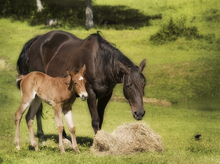Still treating today's parasites based on yesterday's calendar? In the world of human medicine, you’ve likely heard about concerns of bacteria becoming increasingly resistant to antibiotics.1 It works like this: Each time a person takes an antibiotic, sensitive bacteria are killed. Resistant germs, however, are left to grow and multiply, ultimately creating a population of “supergerms” that don’t respond to traditional antibiotics.1

Parasite resistance to deworming products
Parasites have developed resistance to commonly used anthelmintic classes meaning that horses may have parasites that are resistant to some of the deworming products currently being used.
What’s that got to do with horses and parasites? Well, a similar theory applies. Over the years, parasites have developed resistance to certain commonly used anthelmintic classes.2 What does that mean for horse owners? Their horses may have parasites that are resistant to some of the deworming products they may be currently using.2
So not only could you be wasting money on products that no longer work on some parasites, but you could also be putting your horse’s health at risk and helping create bigger populations of resistant parasites.3
How can I be contributing to the development of parasite resistance? Horse owners around the country are asking how that can happen if they’ve carefully adhered to the decades-old recommended practice of rotational deworming.
The answer is simple: Parasites have responded to the anthelmintic challenge by developing resistance. In the case of small strongyles, identified as the most prevalent parasite in adult horses today,2 there is evidence of their widespread resistance to two of the three major dewormer classes – benzimidazoles and pyrantels.2,4,5 The common practice of rotation has not done anything to slow this down.6
Hoyt Cheramie, DVM, MS, equine specialist, Merial’s Large Animal Veterinary Services, says to ensure their farms are managed properly for equine parasites horse owners should follow these steps:
STOP treating every horse the same. We now know only 20 to 30 percent of horses in a herd shed about 80 percent of the worm eggs.3 Thus, it doesn’t make financial or medical sense to treat every horse with the same eight-week frequency.
START working with your veterinarian to establish a more effective parasite control program. Have a fecal egg count test (FECT) run for each horse to identify which parasites are present and whether that horse is a high, medium or low shedder.
DEVELOP a plan with your veterinarian for each horse based on the results of the FECT, the horse’s environment and the climate.
FOLLOW UP with fecal egg count reduction tests (FECRT) to determine whether specific products are still effective against the parasites on your farm.
DISCONTINUE using any of the products previously on your schedule that are not effective against the parasites on your farm.
INCORPORATE a broad-spectrum product like
ZIMECTERIN® Gold (ivermectin/praziquantel). In large-scale studies,
ZIMECTERIN Gold has been proven to be effective against benzimidazole-resistant small strongyles.2,5,7 ZIMECTERIN Gold was also the first dewormer approved by the FDA to effectively control tapeworms,* which have been recognized as a significant threat to the health of horses.8
Managing all parasites, including tapeworms, through a strategic deworming program may help save money in the long run and help protect effective products as you’ll no longer be treating blindly.3 Strategic deworming might also be easier than you think.
More information about parasites, effective Deworming Strategies and
ZIMECTERIN Gold
*Anoplocephala perfoliata
About ZIMECTERIN Gold
ZIMECTERIN Gold combines ivermectin, a leading ingredient that controls a wide variety of parasites, with praziquantel, an ingredient that specifically controls tapeworms. Together, they provide excellent equine parasite control. ZIMECTERIN Gold is approved to control more species and stages of equine parasites than any other brand, including benzimidazole-resistant small strongyles.7 It controls 47 species and stages of equine parasites in all.9,10
Important Safety Information
Warning: Not for use in humans. Keep this and all drugs out of reach of children. In horses, there have been rare reports of swelling and irritation of the mouth, lips and tongue following administration of ZIMECTERIN Gold. These reactions have been transitory in nature. Do not use in other animal species as severe adverse reactions, including fatalities in dogs, may result.
1Centers for Disease Control. Antibiotic Resistance Questions & Answers. Available at: http://www.cdc.gov/getsmart/antibiotic-use/antibiotic-resistance-faqs.html#e. Accessed January 14, 2013.
2Kaplan RM, et al. Prevalence of anthelmintic-resistant cyathostomes on horse farms. JAVMA. 2004;225(6):903-910.
3Kaplan RM. These ain’t your father’s parasites: Dewormer Resistance and New Strategies for Parasite Control in Horses. In: Proceedings 2009. Florida Equine Institute. Gainesville, Fla.
4Kaplan RM. Anthelmintic resistance in nematodes of horses. Vet Res. 2002(33):491-507.
5Woods TF, Lane TS, Zeng QY, Courtney CH. Anthelmintic resistance on pleasure horse farms in north central Florida. In: Proceedings 42nd Annual Meeting of the AAVP; 1997:88.
6Swiderski C, French DD. Paradigms for parasite control in adult horse populations: A review. In: AAEP Proceedings. 2008;54:316-321.
7Lyons ET, Tolliver SC, Ionita M, Collins SS. Evaluation of parasiticidal activity of fenbendazole, ivermectin, oxibendazole, and pyrantel pamoate in horse foals with emphasis on ascarids (Parascaris equorum) in field studies on five farms in Central Kentucky in 2007. Parasitol Res 2008;103:287-291.
8Proudman CJ, Trees AJ. Tapeworms as a cause of intestinal disease in horses. Parasitol Today. 1999;15(4):156-159.
9Based on data provided in the FDA Freedom of Information summaries.
10Based on data provided on the ZIMECTERIN Gold label.
